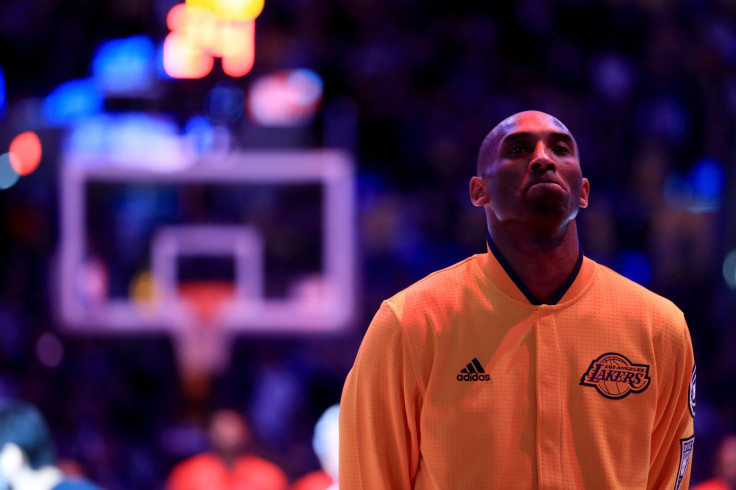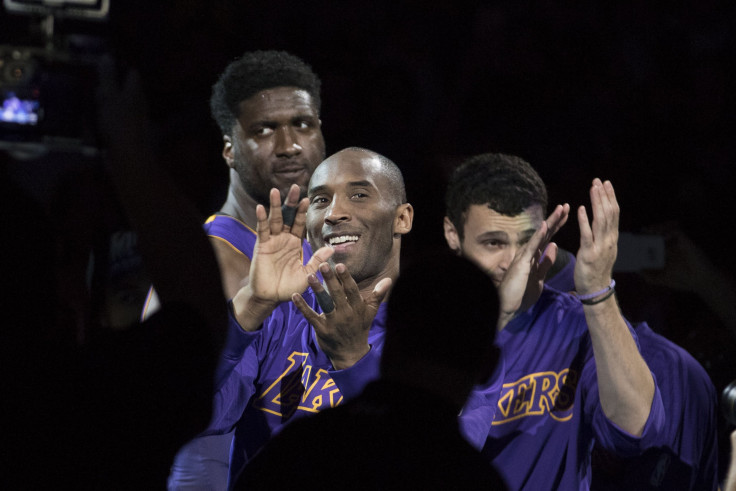After Kobe Bryant’s Retirement, Embattled TWC SportsNet Faces A Rebuild Of Its Own

UPDATE: 7:42 p.m. EDT — Shortly after this article posted, a spokesman for Time Warner Cable told International Business Times that rumors that TWC Deportes will shut down are absolutely false, and the channel plans to broadcast “for many years to come.” He also confirmed that SportsNet LA is available on Bright House, as well as Time Warner and Charter.
Original story:
LOS ANGELES — The funereal mood and melancholy Facebook tributes spreading across this town on Thursday have nothing to do with an earthquake, a brushfire or any of the other natural disasters the region is known for. Rather, they are a collective homage to the city’s prodigal son: Kobe Bean Bryant, a man who’s been a Laker for more than half his life, and who will put on the purple-and-gold uniform one last time for his final game as an NBA player.
But Lakers fans could soon have a front-row seat for an even bigger series of changes in the local sports broadcasting landscape. SportsNet, the channel owned by Time Warner Cable that has exclusive rights to air most Lakers games, is struggling with declining viewership, while the cable operator’s L.A. regional sports networks face $13 billion in rights fees committed over the next 20 years. It’s a dizzying figure that no Kobe retirement tour can pay for, no matter the pomp and circumstance.
TWC SportsNet’s ratings are already down significantly this year, and without the lifeline that Bryant’s last go-round has provided, they could fall off a cliff. Even with Bryant, the Lakers have the lowest TV ratings since they moved to Los Angeles 56 years ago, according to the Los Angeles Times. At the end of last year, the team was averaging a 1.68 rating on TWC SportsNet, down from 4.35 during the same time of the season three years ago. Considering that TWC paid $5 billion for the team’s broadcast rights five years ago, that’s simply not sustainable.
On top of that, a deal Time Warner Cable signed with the Los Angeles Dodgers in 2013 looks increasingly like an albatross that could threaten the viability of TWC’s L.A. sports networks as a whole. National sports rights deals keep getting bigger and longer — Turner and CBS just extended their agreement to broadcast the NCAA Men’s Basketball Tournament to 2032 — and local arrangements are no exception. Back in 2011, when the Lakers — and cable networks — were riding high, TWC signed a 25-year, $5 billion deal to broadcast the team’s home and road games not aired nationally by Turner Sports’ TNT. The cable company followed that up two years later by reaching a deal with the Dodgers that guaranteed the baseball team $8.35 billion over 25 years, broadcasting its games on SportsNet LA, a channel jointly owned by the Dodgers and TWC.
TWC reached deals fairly quickly with other distributors to carry TWC SportsNet, which costs $3.95 per subscriber according to research firm SNL Kagan, and that channel — and Spanish-language TWC Deportes — is widely available on the basic sports tiers of most cable and satellite TV providers in Southern California. But the other providers balked at TWC’s initial price of $4.90 per subscriber for SportsNetLA, and did so again when the company dropped its ask to $3.50 — but on a one-year arrangement only.
That means most Dodger games are unavailable to the majority of Angelenos who use providers other than TWC and Charter Communications — which is in the process of buying TWC and Bright House Communications in a $67 billion deal. And TWC’s inability to recoup that massive investment by striking deals is a harsh reminder that Angelenos’ appetites for local sports have their limit. TWC appeared to be counting on outrage from dissatisfied Dodger fans to pressure providers into cutting a deal. But talking to Dodger fans in L.A., that outrage is mostly directed the other way.

The three TWC regional sports channels already made deep cuts in September, related to ratings. Time Warner Cable Sports President David Rone, who oversaw the Dodgers’ and Lakers’ regional sports networks, left in late October, and will not be replaced. TWC Deportes lost almost all its staff during the September layoffs and is rumored to be close to shutting down.
Along with the New York Knicks, the Lakers have been one of the teams that pioneered using a regional sports network to build a loyal fanbase. The team’s late and longtime owner Jerry Buss was an original owner of Prime Ticket, the local cable channel that broadcast Lakers basketball and Los Angeles Kings hockey games until 1994. Prime Ticket’s spot on the basic tier of cable packages, back before there were hundreds of other channels, exposed a growing region to the 1980s’ Showtime Lakers and announcer Chick Hearn, a ubiquitous presence in living rooms from Woodland Hills to Watts who coined “slam dunk,” “charity stripe,” “garbage time” and countless other terms that have become part of the standard basketball lexicon.
That happened because from October to June across Southern California (the Lakers tended to go deep into the playoffs), Hearn — who called Kobe’s first games as an 18-year-old in 1996 — was always on. Voice of the Dodgers Vin Scully, baseball’s closest thing to Hearn, is announcing his 67th and final season, and the vast majority of Dodger fans can’t even listen.
Given the changes on the horizon, Kobe’s retirement could mark the end of an era for Lakers fans in more ways than one.
© Copyright IBTimes 2025. All rights reserved.





















